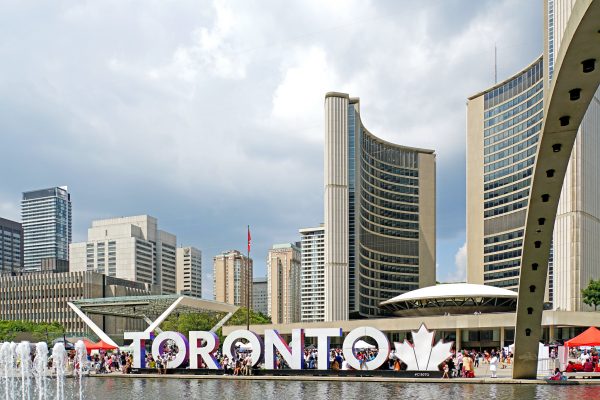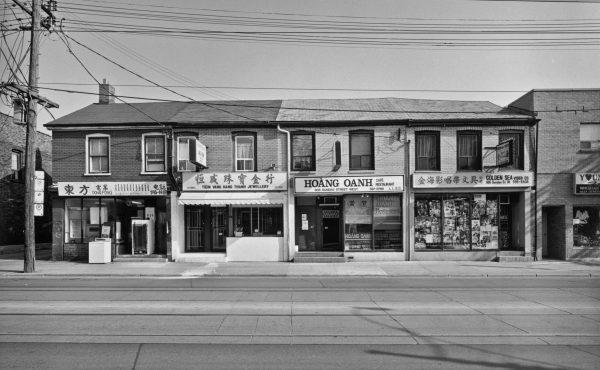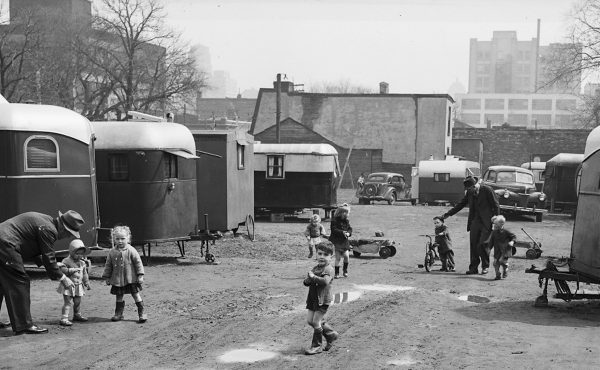
On Saturday afternoon, a group of about 150 people of all ages gathered at 145 St. George, an 11-storey 1960s-vintage apartment building immediately north of the subway station. Their goal: to protest the proposed demolition of this and several other mid- or high-rise rental buildings that sit on land deemed sufficiently valuable that developers can take them down and replace them with much larger ones, and still make a profit.
The applications for 145 St. George and 25 St. Mary Street both come from 10Block, a development firm. There are 389 apartments in these two buildings combined, many of them reasonably priced. Across Toronto, there are about 3,500 rental units in buildings with more than 20 apartments that are now facing demolition orders, according to a city spokesperson.
During Saturday’s protest, Jessica Bell, the NDP MPP for University Rosedale, cited more stats from the city and then sent me a list of current demolition applications. Many are for a few dozen units, but there are several with over a hundred apartments, such as 55 Brownlow, a slab apartment near Mount Pleasant, Eglinton, 48 Grenoble, a nine-storey building in North York, and 7-11 Rochefort Dr., a low-rise stacked townhouse complex near the Science Centre.
The tenants’ associations in three of these buildings have found each other. There’s now a Twitter account and outreach to some local politicians, including mayoral candidate Chloe Brown, and the inevitable sign-up sheets. It will be interesting to see if this network grows, makes common cause with other increasingly dispossessed tenants’ groups, and gathers some political momentum. I suspect it will. And it should.
As we kick off this 200-metre freestyle of a mayoral campaign, I’d urge the people vying for the top job to think about tenants… for a change.
The candidates need to be laser-focused on their plight, and not conflate laissez faire intensification with intentional housing reforms that add genuinely affordable supply. The first step, it seems to me, is to not make the current crisis even worse than it already is.
Half the city’s population are tenants, which means that hundreds of thousands of Torontonians now live with the escalating instability and anxiety that is the rental market. I’m not going to trot out the averages — we’ve all heard them, and the figures are outrageous, if not a crime. Landlords hike rents on units after tenants move out by eye-watering amounts, basically whatever the market bears. Buildings change hands and the new owners drive ahead with renoviction strategies. As for tenants who rent investor-owned condos in newer buildings, they have been completely abandoned in terms of rent control thanks to the Ford government.
What’s more, the development industry has also succeeded in persuading its friends at Queen’s Park to lift one of the few remaining protections afforded tenants, which is the rental unit replacement provision in the City of Toronto Act, Section 111. The upshot is that hundreds of older rental buildings, and not just small ones, have targets on their backs — a turn of events that will force thousands into a market with no breathing space at all. What could go wrong?
A bit of parsing is in order: intensification around transit stops is important, but it can’t be all super-tall condos. The city needs to push for more purpose-built rental, everywhere. Canada Mortgage and Housing, in turn, has to find a way to get the billions it has earmarked for rental projects out the door. The next mayor has to push these last two objectives relentlessly.
But the next mayor also has to find a space to advocate for a sane intensification strategy that doesn’t involve knocking down large existing apartment buildings. Quite apart from the climate impact, such redevelopment projects merely amp up the pressure on the rental housing market.
Several of the demolition projects now in the pipeline promise to replace all the demolished rental units and provide the tenants with some funds to make other arrangements, as well as right of first refusal once the new building is complete. But in this market, these measures (which are no longer mandatory) fail on a human level.
[Correction: According to a city spokesperson, “the City continues to implement its Rental Housing Demolition and Conversion Control By-law and rental replacement policies. The Province, through Bill 23 has introduced the ability to regulate municipal rental demolition by-laws. However, as of today they have not enacted any regulations to remove the City’s rental replacement protections.”]
Thousands will be thrown out of their homes at a time when finding any kind of apartment, much less a half-decent one, is nearly impossible. And then they’ll have to wait, and wait, and wait, until that moment way off in the middle distance when they get to exercise their right of return. However, many won’t because they can’t put their lives on hold for that long.
To be clear, I have no issue with up-zoning main streets and residential streets lined with single family homes, particularly those close to subway stations. Homeowners have agency, and they’ll be amply rewarded if and when they sell to a developer. Knocking down decent-sized apartment buildings, on the other hand, seems wrong-headed and, frankly, cruel.
Over the next two months, we’re all going to hear a lot of breathy rhetoric about crime waves, unsafe transit vehicles, inefficient council meetings, dissembling civil servants, inadequate taxes, or taxes that are too high. The campaign will or should alight on topics of genuine concern — public space in a rapidly intensifying city, the fate of the core, the future of cycling infrastructure, and so on.
But this contest has to be an election about housing, and in particular rental housing. For too many years, council has had more than its share of elected officials who either didn’t care about tenants or pretended they didn’t exist. Everyone understands why: our elected officials, who generally aren’t tenants, knew who buttered their electoral bread.
No more. The reality of 2023 is that the tenants of Toronto are Toronto’s future. As they go, so goes the city. We need a mayor who understands this foundational, demographic reality in their bones. We need someone who can keep their eye on the ball, and not just the prize.





One comment
Bill 23 reads
“The Schedule amends section 111 of the City of Toronto Act, 2006 to give the Minister the authority to make regulations imposing limits and conditions on the powers of the City to prohibit and regulate the demolition and conversion of residential rental properties under that section.”
emphasis on the line “to give the Minister the authority to make regulations”
It doesn’t remove rental replacement, it only allows the minister to make regulations, which have not been made to date. Rental replacement is still a binding policy in Toronto, this article presents facts in a distorted manner that suggests rental replacement is no longer in effect when it very much still is. It would be news to City Planning that rental replacement is gone since they are still telling developers it’s a requirement.